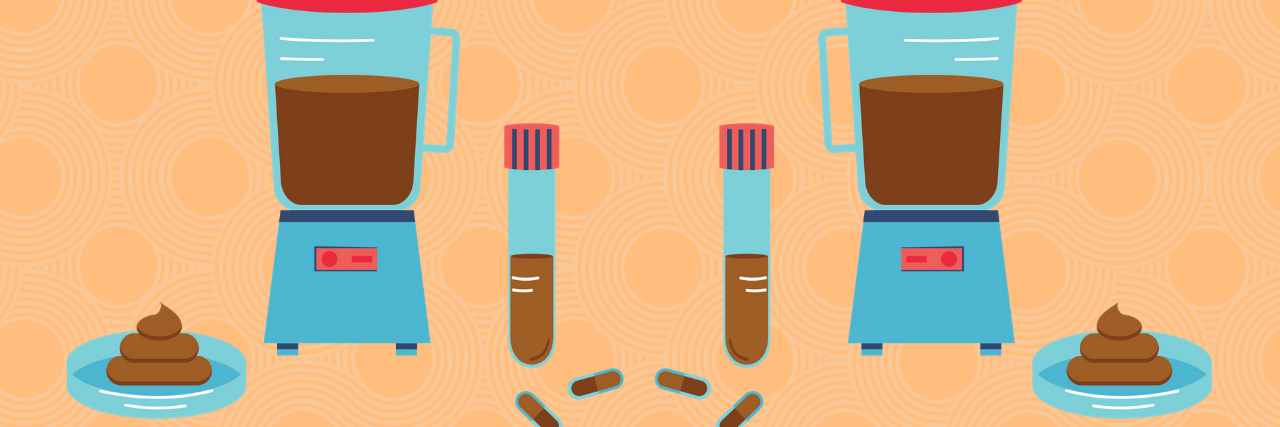On Thursday, the U.S. Food and Drug Administration (FDA) issued a safety alert about the dangers of fecal transplants after it received reports of a patient’s death from the procedure. The FDA’s warning is a reminder do-it-yourself fecal transplants for autism, inflammatory bowel disease (IBD) or other conditions are dangerous and should not be done at home. Fecal transplants are not currently approved by the FDA for any use.
In its safety alert, the FDA outlined how two patients with compromised immune system received fecal microbiota for transplantation (FMT) during a clinical trial. The donor stool used for the transplant was not properly screened for harmful drug-resistant organisms prior to the procedure. Both patients became sick after getting an E.coli infection from the same donor stool and one patient died. The FDA was alerted to the death after researchers reported the death as required. A test of the donor stool revealed the same strand of E.coli that caused the infection in both participants.
The FDA also reminded experts of its guidelines for conducting fecal transplants in investigative clinical trials, which should include thorough screening donor samples for multi-drug resistance organisms. According to the New York Times, as a result of the patient’s death, the FDA has also shut down a number of clinical trials involving fecal transplants until researchers can prove they have appropriate safety screening procedures in place.
Fecal transplants are currently administered by collecting stool from healthy donors to reset the gut bacteria in a patient’s gastrointestinal (GI) tract. The procedure is done using one of four methods: colonoscopy, enema, nasogastric (NG) tube or “poop pills” which contain frozen bacteria from the donor sample. Based on clinical research so far, transplanted fecal matter reintroduces healthy gut bacteria into the patient, which can reduce GI symptoms. Gut bacteria plays a crucial role in the body’s immune system and health.
The best evidence for the use of fecal transplants is treating antibiotic-resistant C.difficile, a bacteria that causes a GI infection (colitis) that most often leads to diarrhea, stomach pain, and fevers. In the case of a resistant C.difficile infection, fecal transplant may be an option for patients who have not responded to three available antibiotics to treat it. Most doctors who do fecal transplants will only use it as a last resort for patients with antibiotic-resistant C.difficile, following current FDA guidelines.
Though research on using fecal transplants for other health conditions like Crohn’s disease, ulcerative colitis, and irritable bowel syndrome (IBS) show promise in some early studies, more research is needed. Interest in fecal transplants has also extended into more unexpected realms, like autism. The FDA considers these other areas of research experimental. To get around the FDA, many DIYers looking for relief have created instructional materials online on how to do a fecal transplant at home.
Some DIY fecal transplant advocates do encourage users to have donor stool tested for potentially dangerous bacteria, but testing is likely rare. Many who have tried a fecal transplant said it improved their symptoms, which can be tempting for those with chronic and debilitating symptoms when many other treatments have failed.
DIY fecal transplants have also been suggested as a potential at-home “cure” for autism. Though some questionable evidence might support this claim, it does not take into account significant safety concerns. At-home fecal transplants join other harmful practices spread online like consuming chlorine dioxide — aka industrial bleach. Amazon recently removed books marketing this dangerous practice. There is no scientific evidence either procedure benefits people on the spectrum, but there is a well-documented body of research that indicates trying to DIY medical treatment can cause serious digestive symptoms or death.
In addition, viewing autism within the medical model — a model that tries to “fix” what’s “wrong” — doesn’t work. Autism is a neurodiverse way of being human — there is nothing to “cure” or “fix.” Unlike many of the “medical” treatments targeted at autism, neurodiversity does have scientific backing. This means autism acceptance — honoring the different ways people show up in the world — is a more productive, safe, and supportive approach.
As Thursday’s FDA warning underscores, fecal transplants can have deadly consequences even in what should be the most controlled circumstances — clinical trials. Marc D. Makhani, MD, a gastroenterologist and founder of LA Digestive Health and Wellness, told The Mighty via email other dangers of trying to do a fecal transplant at home include “rectal or colonic perforation, severe colitis, sepsis and death.”
If you have questions about fecal transplants and how they may benefit your health, Makhani recommends reaching out to a gastroenterologist in lieu of risky at-home medical procedures. In light of the recent patient’s death, the FDA said more work needs to be done before it will expand the use of fecal transplants in research and clinical practice. According to the FDA, informing patients about the risks is the first step.
“While we support this area of scientific discovery, it’s important to note that FMT does not come without risk,” Peter Marks, M.D., Ph.D., director of FDA’s Center for Biologics Evaluation and Research said in a safety communication. “We’ve become aware of infections with multi-drug resistant organisms after patients received investigational FMT, including one patient death. We therefore want to alert all health care professionals who administer FMT about this potential serious risk so they can inform their patients.”
Header image via Greenvector/Getty Images

